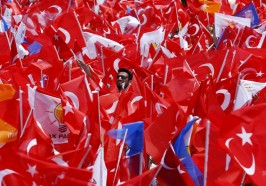An in-depth research project commissioned by the International Raoul Wallenberg Foundation sheds light on Muslim Turks and Kurds who reached out to Armenians a century ago.
 Supporters of the ruling AK Party wave Turkish national and party flags at an election rally for Turkey’s June 7 parliamentary election, in Antalya, Turkey, June 6, 2015. (photo credit: REUTERS)
Supporters of the ruling AK Party wave Turkish national and party flags at an election rally for Turkey’s June 7 parliamentary election, in Antalya, Turkey, June 6, 2015. (photo credit: REUTERS) Positive pedagogy is a consistent approach which has been applied in recent decades by the International Raoul Wallenberg Foundation (IRWF). This New York-based global-reach NGO, which we are honored to lead, is devoted to preserving and divulging the courageous legacies of Swedish diplomat Raoul Wallenberg and heroes like him who reached out to the victims of persecution, regardless of the religion or nationality of rescuers or survivors.
In connection with the Holocaust, the Wallenberg Foundation has been implementing this same guiding principle with remarkable success.
While recognizing the vital importance of studying and teaching the atrocities perpetrated by the Nazis and their collaborators, an aspect which is fully and justifiably covered by a great number of institutions, the IRWF focuses on the rescuers instead; shedding light on their stories; researching their feats; instilling their spirit of solidarity in the hearts and minds of the young generations who are eager to embrace positive role models.
The “Medz Yeghern” (or “Great Crime,” which is the terminology used by the Armenians themselves to depict the horrific events which started to unfold in 1915) has regrettably turned into a matter of political controversy, mainly between Armenians and Turks.
The mere use of the pair of words “Armenian genocide” generates heated emotions on both sides of this divide.
Definitions are certainly meaningful, but setting them aside, the indisputable fact is that a century ago more than a million defenseless Armenians who lived within the boundaries of the Ottoman Empire perished in the most tragic and horrific circumstances.
The key issue is to honor the historical truth and at the same time, create the framework for building bridges of understanding for the young generations.
Highlighting the feats of the rescuers is, from our perspective, the most suitable tool to achieve this double goal.
In line with our positive pedagogy perspective, we have joined efforts with Professor Taner Akcam, of Kaloosdian/Mugar Chair in Holocaust and Genocide Studies at Clark University, who supervised the report we commissioned about the Turkish and Kurdish rescuers.
Despite the fact that 100 years have elapsed, the report in question, which was recently published in Turkish and translated into Armenian, English and Spanish, has come up with the names of more than 180 Turkish and Kurdish rescuers, including clan chiefs, religious leaders, notables and ordinary persons.
These noble people were not indifferent to the plight of the Armenians and reached out to them.
Among those mentioned in the report is Mehmet Celal Bay, who served as governor of Aleppo and Konya and is probably the best known of all Turkish rescuers. He is credited with saving the lives of thousands of Armenians. By his own admission, during his tenure as governor of Aleppo he did not believe that the aim of the deportations was to liquidate the Armenians, but later he changed his mind. When he defied the orders of deportation he was removed from his post and got transferred to Konya, where he repeatedly demanded from the central government that shelters be provided for the deportees, insisting that the measures against the Armenians were “contrary to interests of the fatherland.” During his service in the Province of Konya, which became a gathering point for the Armenian deportees, he managed to save thousands of them, sparing them from deportation.
Being a member of the Ottoman royal family and the son of a high-ranking official from the finance ministry, the authorities contented themselves with removing him from office rather than murdering him, which was the fate of other officials who dared oppose the official orders.
The rigorous and painstaking approach of the research is paying off. Feats of solidarity cannot be blurred even if they happened a century ago. Gratitude has no date of expiry.
Having finalized the first stage, we are now in the process of recognizing each and every rescuer by collecting further evidence while at the same time trying to locate their living relatives. This extra effort will enable us to pay posthumous tribute to these heroes and to include their awe-inspiring stories in our educational programs.
In our opinion, this perspective will help address the past in a positive fashion, and will facilitate the creation of a fruitful and respectful dialog between all the parties involved, building a setting of understanding and reconciliation for the sake of the young generations of Armenians and Turks who deserve to share, as neighboring partners, a better future, without forgetting the tragic past.
This would have a positive impact not only on the people living in Armenia and Turkey, but also on the Armenian diaspora and the Turkish expatriates, and would serve as an example to other zones of conflict, emphasizing that living in peace and harmony is a desirable and practical goal.
Eduardo Eurnekian is the chairman and Baruch Tenembaum the founder of The International Raoul Wallenberg Foundation.
